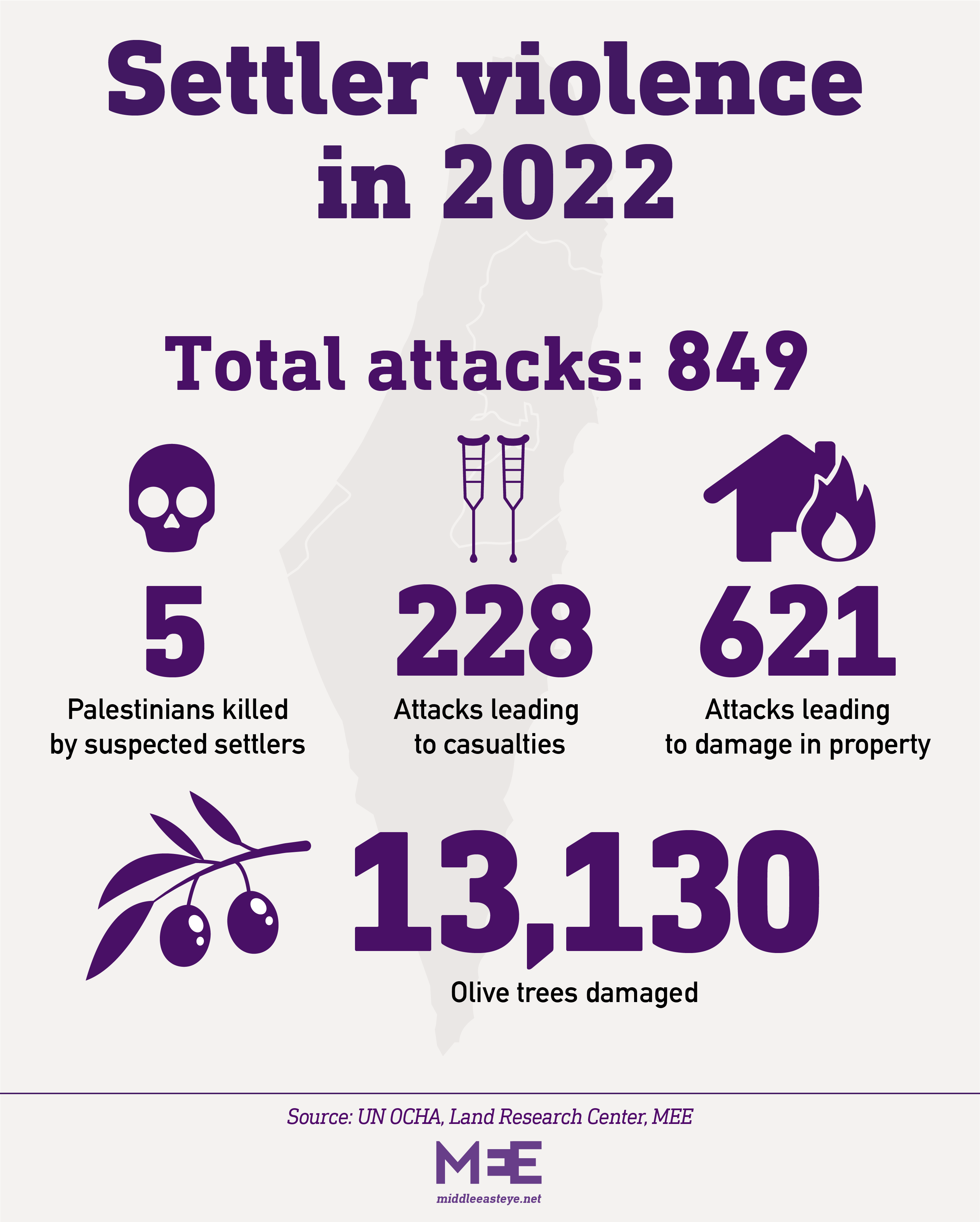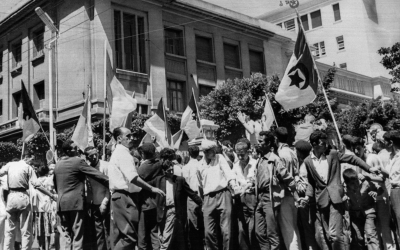Unlike Ukrainians, who are recognised as belonging to the European ‘self’, Palestinians remain subject to stigmatising representations despite what they suffer at the hands of the Israeli occupation
The conflict between Israel and the Palestinians in the occupied territories has been sliding back into a new cycle of heightened tension and violence in the last few months, and more so since the beginning of 2023.
Whereas this development hardly comes as a surprise to most observers, what is striking is the increasingly unbalanced attitude of Western states, and especially the usually more “equidistant” Europeans. Though many examples can be derived from recent events, one instance is particularly illustrative of this trend.
Despite the similarities between Ukraine and Palestine, cognitive biases lead European diplomacies and media to interpret these two conflicts in almost opposite ways
On 26 January, an Israeli military operation in the Jenin refugee camp resulted in the death of nine Palestinians and the injury of 20 more. The following evening, a Palestinian attacked Jewish Israelis leaving a synagogue, killing seven and injuring several more. On this second event, the reaction of the European Union (EU) came swiftly on 28 January. Through the voice of its high representative (HR), the EU said that it was “horrified” by these “frightening terrorist attacks” and strongly condemned these “senseless acts of violence and hatred”.
The European reaction to the first event followed a few minutes later, ie more than 48 hours after it happened. In his statement, the high representative noted the number of Palestinians killed and injured “during an operation conducted by the Israeli Defence Forces”.
While acknowledging that since the beginning of 2023, 30 Palestinians had been killed, the high representative stressed nevertheless that the EU “fully recognises Israel’s legitimate security concerns, as evidenced by the latest terrorist attacks”, merely calling for lethal force to be used only as a last resort.
Fairly typical of the reactions of European diplomats and “mainstream” media to Israeli-Palestinian affairs, these two statements betray the extent of the “Orientalist” gaze (in reference to the concept developed by Edward Said) that European countries continue to have on the Middle East, its conflicts and its deaths. This contrast is all the more revealing as these same countries are mobilising, at the same time, more and more means to help another population, the Ukrainians, facing Russian military aggression.
There is no questioning here of the legitimacy of the Ukrainian struggle or the relevance of the support given to this besieged country, but rather, a questioning of European attitudes towards the Palestinians. From the point of view of international law, both situations in Ukraine and Palestine are characterised by a de facto occupation and the illegal use of military might by a state to establish control over another territory and population.
But what are the cognitive biases that lead European diplomacies and opinions to interpret these two conflicts in almost opposite ways?
Facts on the ground
The deleterious stalemate in the Palestinian territories is very well-documented. The three-decade-old Israeli-Palestinian peace process launched in Oslo in September 1993 has not enabled the Palestinians to make progress towards self-determination.
On the contrary, the hope raised by the “land for peace” approach seems more illusory than ever. In direct violation of international law and, in particular, the Geneva Conventions, the Israeli colonisation of Palestinian territories has grown considerably. At the beginning of 2023, the number of Israeli settlements reached 132 “legal” settlements and 147 “illegal” settlements, according to Peace Now statistics.
The number of Israeli settlers has increased from 116,300 in 1993 to 465,400 in 2021. Recent announcements by the Netanyahu hardline government promise more.
Palestinians are trapped in Gaza and the West Bank, where the Israeli “security fence”, deemed illegal by a 2004 advisory opinion of the International Court of Justice, fragments communities and encroaches on territories that are supposed to remain Palestinian.
With technological advances, the lives of Palestinians are more than ever marked by confinement, surveillance and control. Their access to water and land is limited as is their mobility. Demolitions of Palestinian houses and infrastructure are commonplace, particularly in East Jerusalem.
In addition, violence perpetrated by both Israeli forces and settlers in the Palestinian territories largely escapes any form of accountability. The settlers’ violent raid in Huwwara town on 26 February is yet another consequence of the state’s impunity.
Over the years, voices have been raised to alert Western diplomats and media to the plight of the Palestinians and the violence they face. Several reports have documented Israeli practices that constitute crimes of apartheid and persecution against Palestinians, including B’Tselem, an Israeli NGO.
In October 2022, an independent commission set up by the UN Human Rights Council also investigated the multifaceted violence suffered by Palestinians, calling on UN members to fulfil their obligations under international law. Uselessly so far.
The Israeli ‘self’ and the Palestinian ‘other’
The blindness of European countries to the Palestinian plight under Israeli occupation can be explained by a convergence of rational interests and the acceptance of the Israeli narrative.
There are indeed many “rational” interests that can lead European countries to ignore Israel’s structural violation of international law. Israel is not only a highly developed country, well-integrated into economic and financial globalisation, but it is also very advanced, especially in high-tech fields related to the defence and surveillance industries.
It has also been able to make the most of its experience in the fight against terrorism at a time when attacks were targeting several European countries.
The discovery of gas resources in the eastern Mediterranean and Israel’s ability to assert itself as a leading state in the response to the Covid-19 pandemic have reinforced its international stature. Differently put, Israel belongs to the same club of developed and affluent countries, and trade, exchanges and cooperation with it are highly valued.
Beyond these interests, European countries continue to read the situation in Palestine through the Israeli narrative which has consistently justified it as a consequence of “Palestinian terrorism”.
The difference in the kind of violence that is exerted respectively by Israelis and the Palestinians allows ample space for this narrative. Indeed, spikes in widescale violence have been occasional after the clamping down of the Second Intifada, and most of the lethal Israeli actions against the Palestinians are usually contained and make it easier to European governments and media to look the other way.
In addition, the daily non-directly lethal violence of the occupation and the engulfing control of the Palestinian territories and lives is one that can be comfortably ignored. In contrast, the Palestinian use of any violent means against the occupation is automatically framed in terrorist terms and understood only as wanton violence that feeds into the Israeli narrative.
Although suicide bombings have become rare, attacks with knives, shootings, car rammings, or rockets are therefore perceived by Western public opinion not so much as the means of the weak against the strong, but that of the barbarian against the civilised.
However, whatever their importance, rational interests and the adoption of the Israeli narrative regarding terrorism and occupation cannot explain the extent of European empathy towards increasingly hawkish Israeli governments. The power of the orientalist bias offers a very useful complementary explanatory key.
An orientalist bias
In his 1979 book Orientalism, Edward Said, a professor of comparative literature of Palestinian origin, deconstructed visions of the “Orient” held by the colonial powers and the contemporary diplomatic apparatuses that are their heirs.
This ground-breaking work has significantly contributed to a then-emerging critical theory in social sciences: postcolonialism, which is interested in the persistence of Western domination over the rest of the world, especially through the discourses produced by the Western centre and the resulting power relations.
The conflict in Ukraine and Western reactions contribute to exposing the extent of Orientalist narratives and representations on which double standards are based
This analytical frame offers interesting keys to understanding the cognitive and discursive forces that underlie western approaches to the Middle East. These dynamics are shaped by Orientalism, Said powerfully argues, which is based on the postulate of material and moral Western superiority that feeds on the depreciation of Eastern societies and cultures.
From this superiority stems the legitimisation of the colonial and then hegemonic practices of the Western powers with regard to an East erected as a politically and culturally subaltern “Other”. This othering of Eastern societies is prolonged by a negative perception of their members, based on the essentialisation of certain characters and behaviours.
The image of the dominated Muslim woman, powerless and waiting for salvation from the West, or that of the violent and murderous Arab, offer illustrative instances that have already been deconstructed by many researchers.
Born of European history at the hands of European Jews, the Israeli state has claimed to be and was perceived very early on as being, in the image of the West. Its military successes, supported by Western know-how and means, and its economic and scientific achievements, thanks to its intimate insertion in the networks of the globalised economy and those of knowledge production, have only reinforced this identification.
Thanks to these identification dynamics which feed on the same stance of cultural and moral superiority in relation to an environment that is supposedly wantonly hostile and whose violence justifies its tough policies, Israel enjoys unwavering Western support. Meanwhile the Palestinians never manage to appear as anything other than a population closed to any compromise, radical and violent in its demands and in its practices.
Unlike the Ukrainians, who are recognised as belonging to the European “self”, Palestinians remain subject to stigmatising representations, despite what they suffer at the hands of the Israeli military occupation and colonial enterprise.
The conflict in Ukraine and Western reactions to it contribute to exposing, more starkly than ever, the extent of orientalist narratives and representations on which double standards are based.
To date, none of the Palestinian struggles have been understood and perceived as legitimate by Western diplomacies. More sensitive to Israeli victims and narratives, these diplomacies finally contribute to reinforcing the repressive and colonial policies of increasingly extremist Israeli governments and hence to the perpetuation of the conflict and the resentment of many Middle Eastern populations against them.
The views expressed in this article belong to the authors and do not necessarily reflect the editorial policy of Middle East Eye.
Post Disclaimer
Disclaimer: Why Europe sees Ukrainians as victims, but Palestinians as 'the other' - Views expressed by writers in this section are their own and do not necessarily reflect Latheefarook.com point-of-view

